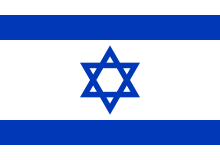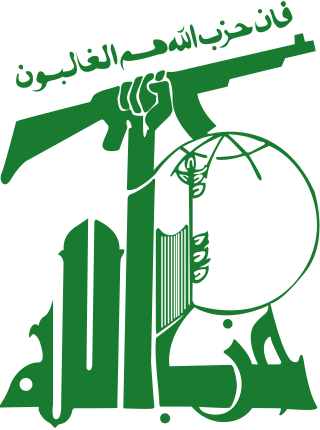
Hezbollah is a Lebanese Shia Islamist political party and paramilitary group. Hezbollah's paramilitary wing is the Jihad Council, and its political wing is the Loyalty to the Resistance Bloc party in the Lebanese Parliament. Its armed strength was assessed to be equivalent to that of a medium-sized army in 2016.

Hassan Nasrallah was a Lebanese cleric and politician who served as the secretary-general of Hezbollah, a Shia Islamist political party and militia, from 1992 until his assassination in 2024.

The Islamic Revolutionary Guard Corps, also known as the Iranian Revolutionary Guards, is a multi-service primary branch of the Iranian Armed Forces. It was officially established by Ruhollah Khomeini as a military branch in May 1979 in the aftermath of the Iranian Revolution. Whereas the Iranian Army protects the country's sovereignty in a traditional capacity, the IRGC's constitutional mandate is to ensure the integrity of the Islamic Republic. Most interpretations of this mandate assert that it entrusts the IRGC with preventing foreign interference in Iran, thwarting coups by the traditional military, and crushing "deviant movements" that harm the ideological legacy of the Islamic Revolution.

The relations between Iran and Israel are divided into four major phases: the ambivalent period from 1947 to 1953, the friendly period during the era of the Pahlavi dynasty from 1953 to 1979, the worsening period following the Iranian Revolution from 1979 to 1990, and the ongoing period of open hostility since the end of the Gulf War in 1991. In 1947, Iran was among 13 countries that voted against the United Nations Partition Plan for the British Mandate of Palestine. Two years later, Iran also voted against Israel's admission to the United Nations.

The Quds Force is one of five branches of Iran's Islamic Revolutionary Guard Corps (IRGC) specializing in unconventional warfare and military intelligence operations. U.S. Army's Iraq War General Stanley McChrystal describes the Quds Force as an organization analogous to a combination of the CIA and the Joint Special Operations Command (JSOC) in the United States. Responsible for extraterritorial operations, the Quds Force supports non-state actors in many countries, including Hezbollah, Hamas, Palestinian Islamic Jihad, the Houthi movement, and Shia militias in Iraq, Syria, and Afghanistan. According to Michael Wigginton et al., the Al-Quds Force is "a classic example of state-sponsored terrorism."

The dynamic between the League of Arab States and the Islamic Republic of Iran has been ambivalent, owing to the latter's varying bilateral conduct with each country of the former. Iran is located on the easternmost frontier of the Arab League, which consists of 22 Arab countries and spans the bulk of the Middle East and North Africa, of which Iran is also a part. The Arab League's population is dominated by ethnic Arabs, whereas Iran's population is dominated by ethnic Persians; and while both sides have Islam as a common religion, their sects differ, with Sunnis constituting the majority in the Arab League and Shias constituting the majority in Iran. Since Iran's Islamic Revolution in 1979, the country's Shia theocracy has attempted to assert itself as the legitimate religious and political leadership of all Muslims, contesting a status that has generally been understood as belonging to Sunni-majority Saudi Arabia, where the cities of Mecca and Medina are located. This animosity, manifested in the Iran–Saudi Arabia proxy conflict, has greatly exacerbated the Shia–Sunni divide throughout the Muslim world.
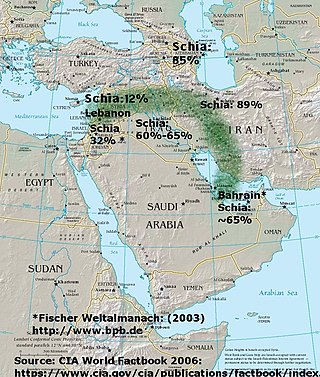
The Shia Crescent is the notionally crescent-shaped region of the Middle East where the majority population is Shia or where there is a strong Shia minority in the population.

Hezbollah, a Shia Islamist political and militant group based in Lebanon, is driven by an ideology that combines religious, political, and social elements. Founded in the early 1980s, Hezbollah's ideology is deeply rooted in Shia Islam and influenced by the Iranian Revolution. Central to its ideology is opposition to Western influence and Israeli occupation, which it frames as a struggle for justice and liberation, while also positioning Islam as a comprehensive solution to social and political issues. Hezbollah's ideological framework is articulated through its foundational documents, such as the 1985 "Open Letter" and the 2009 "New Manifesto," which emphasize themes of anti-Zionism, anti-Americanism, and the establishment of an Islamic state governed by Sharia. The movement also advocates for pan-Islamism and pan-Arabism, promoting unity among Muslims and Arabs while supporting Iran as a model of sovereignty.
Hezbollah has a Foreign Relations Unit and maintains relations with a number of foreign countries and entities. These are particularly Shia states, but also Sunni groups like those affiliated with the Palestinian cause; and the group is also suggested to have operations outside the Middle East in places such as Latin America and North Korea.
Since the Iranian Revolution in 1979, the government of the Islamic Republic of Iran has been accused by several countries of training, financing, and providing weapons and safe havens for non-state militant actors, such as Hezbollah in Lebanon, Hamas in Gaza, and other Palestinian groups such as the Islamic Jihad (IJ) and the Popular Front for the Liberation of Palestine (PFLP). These groups are designated terrorist groups by a number of countries and international bodies such as the EU, UN, and NATO, but Iran considers such groups to be "national liberation movements" with a right to self-defense against Israeli military occupation. These proxies are used by Iran across the Middle East and Europe to foment instability, expand the scope of the Islamic Revolution, and carry out terrorist attacks against Western targets in the regions. Its special operations unit, the Quds Force, is known to provide arms, training, and financial support to militias and political movements across the Middle East, including Bahrain, Iraq, Lebanon, Palestine, Syria, and Yemen.

Qasem Soleimani was an Iranian military officer who served in the Islamic Revolutionary Guard Corps (IRGC). From 1998 until his assassination by the United States in 2020, he was the commander of the Quds Force, an IRGC division primarily responsible for extraterritorial and clandestine military operations, and played a key role in the Syrian Civil War through securing Russian intervention. He was described as "the single most powerful operative in the Middle East" and a "genius of asymmetric warfare." Former Mossad director Yossi Cohen said Soleimani's strategies had "personally tightened a noose around Israel's neck."
Since the establishment of Islamic Revolutionary Guard Corps the organization has been involved in economic and military activities, some of them controversial.

The foreign policy of the Mahmoud Ahmadinejad administration was the policy initiatives towards other states by the former President of Iran, as different from past and also future of the Iranian foreign policy. Ahmadinejad's tenure as president came at a time of greater conflict, rhetorical or physical, than his predecessors. In following this there were various measures, external or internal, that led to his policy changes. This was primarily a division between relations with states of the Western world and the rest of the world.
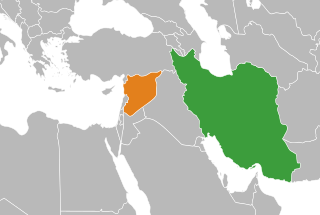
Syria and Iran are strategic allies. Syria is usually called Iran's "closest ally", notwithstanding the conflict between the Arab nationalism ideology of Syria's secular ruling Ba'ath Party and the Islamic Republic of Iran's pan-Islamist policy. Iran and Syria have had a strategic alliance ever since the Iran–Iraq War, when Syria sided with non-Arab Iran against neighbouring Ba'ath-ruled Iraq. The two countries shared a common animosity towards then-Iraqi president Saddam Hussein and coordination against the United States and Israel.
The Axis of Resistance is a network of Iranian-backed militias and political groups in the Middle East dedicated to confront the influence of Israel and United States in the region. The U.S. designates most of these groups as terrorist organizations.

Quds Day, officially known as International Quds Day, is an annual pro-Palestinian event held on the last Friday of the Islamic holy month of Ramadan to express support for Palestinians and oppose Israel and Zionism. It takes its name from the Arabic name for Jerusalem: al-Quds.
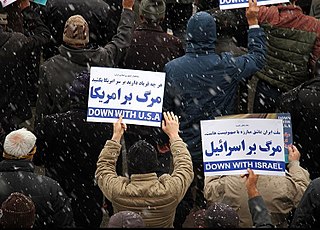
This article deals with political slogans of Islamic republic era in Iran.

There have been explicit or implicit expressions, statements, and rhetoric made by individuals, political entities, and factions within Arab, Islamic, left-wing, or far-right discourse advocating for the elimination of the State of Israel as a political entity. These anti-Zionist calls often involve the use of strong language, genocidal threats, or declarations aiming at the complete eradication of Israel. Such expressions may be manifested in official statements, speeches, charters, or public discourse, reflecting a position that denies the legitimacy of Israel's existence and seeks its destruction through various means, including military or other forms of political and ideological action.

Down with Israel or Death to Israel is a political slogan against Israel, which is also used in Iran and other countries such as Iraq and Mexico. Every year, Iranian pilgrims sing the slogan of "death to Israel" during the Hajj rituals and the ceremony of disavowal of polytheists. This slogan is especially chanted against Israel by demonstrators on Quds Day and is often accompanied by the burning of the Israeli flag. This slogan has also been used in the atmosphere of the Islamic Consultative Assembly of Iran. In the film released from Iran's missile exercise during Mahmoud Ahmadinejad's presidency, the slogan "Death to Israel" was written on ballistic missiles that were fired at replicas. This slogan in Iran does not mean a mere political slogan, but an expression of the vision of the Iranian government towards Israel's current in the region.
